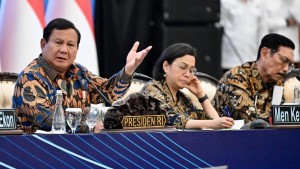Fat cabinet and its impacts on government’s performance
The "fat" cabinet structure, with the possibility for opposition forces joining the government, has turned into a hot topic in the society as it will have significant impact on the government’s efficiency and the check and balances system in the country.
Political expert of the National Research and Innovation Agency (BRIN), Prof. Lili Romli, assessed that the transfer of leadership in the State Intelligence Agency (BIN) from Budi Gunawan to Muhammad Herindra signalled the entry of the Indonesian Democratic Party of Struggle (PDI-P) − essentially an opposition force − into the Prabowo Subianto-Gibran Rakabuming Raka government structure.
Budi Gunawan, a retired police general, is indeed not a party cadre. However, his closeness to PDI-P chairwoman Megawati Soekarnoputri is already an open secret.
It is largely anticipated that Prabowo and Megawati will soon meet to discuss the inclusion of PDI-P in the new Cabinet, which according to Prof. Lili will dash public’s hopes for a strong opposition to control and balance the government.
"The public hopes that the meeting will only be a meeting between fellow national leaders. However, if the meeting ends with PDI-P joining the government, it will certainly disappoint the public," Prof. Lili spoke to Indonesia Business Post in a telephone interview on Thursday, October 17, 2024.
He said further that the so-called fat cabinet structure is considered to significantly change the nomenclature in the government and that the organizational consolidation process is also feared to take a long time. In the mean time, a fat cabinet will certainly drain the state budget to pay for routine expenditures and facilities for ministers, deputy ministers, special staff, and echelon 1 and 2 officials.
"This condition is a serious concern for the public who demand budget efficiency and effectiveness amidst the economic challenges currently facing the country," he said.
On the other hand, the bureaucratic reform initiated by the previous government is considered not completely successful as there is still a lot of homework to do, particularly related to the paternalistic culture and corrupt practices that are still deep-rooted.
"The concept of efficient bureaucracy should prioritize the principle of ‘poor structure, rich function’. However, with the addition of new Cabinet positions, bureaucratic efficiency can become increasingly problematic," he concluded.
Tag
Already have an account? Sign In
-
Start reading
Freemium
-
Monthly Subscription
20% OFF$29.75
$37.19/MonthCancel anytime
This offer is open to all new subscribers!
Subscribe now -
Yearly Subscription
33% OFF$228.13
$340.5/YearCancel anytime
This offer is open to all new subscribers!
Subscribe now







